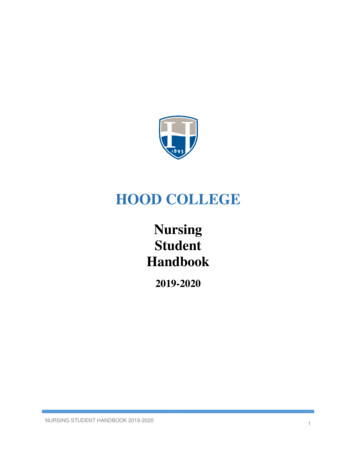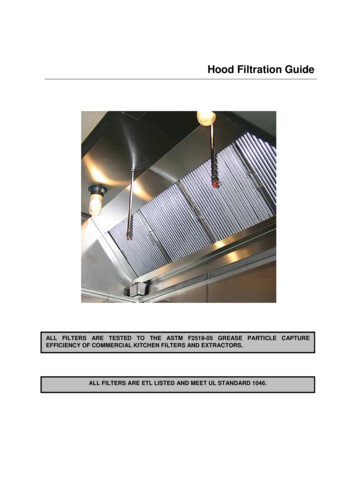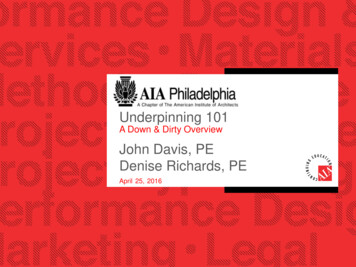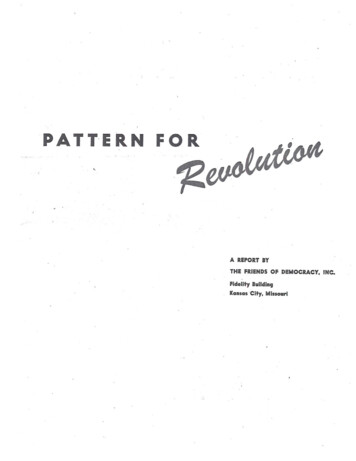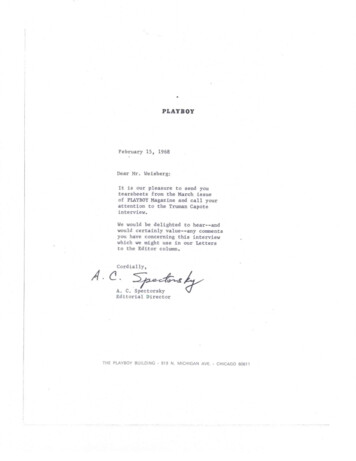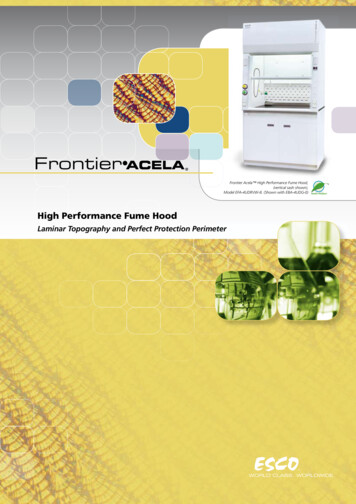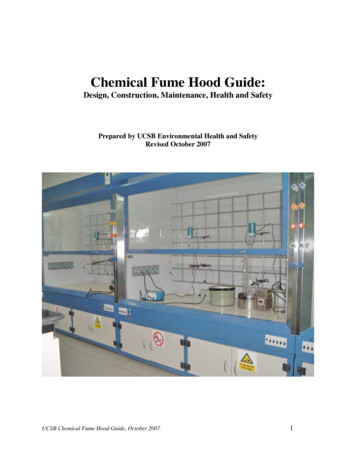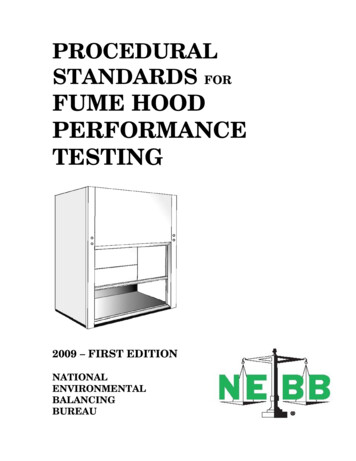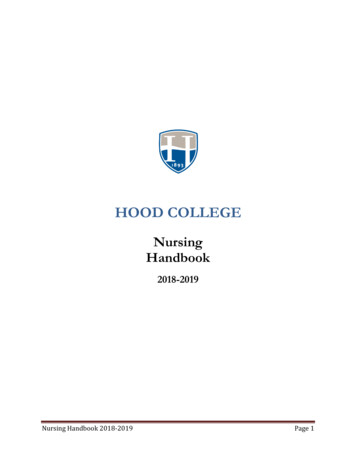
Transcription
HOOD COLLEGENursingHandbook2018-2019Nursing Handbook 2018-2019Page 1
Table of ContentsWelcome . 3Hood College Vision, Mission . 3Department of Nursing Mission . 4Hood College Policies and Procedures Access . 4Nursing Program Outcomes . 4Nursing Program Course Requirements and Descriptions . 5Student Information, Policies and Procedures . 12Faculty Information and Responsibilities . 21Clinical Instructor and Preceptor Information and Responsibilities . 23Clinical Information, Policies and Procedures . 24Teaching Adult Learners . 30ANA Code of Ethics . 33Excerpts from The Essentials of Baccalaureate EducationFor Professional Nursing Practice . 34Nursing Handbook 2018-2019Page 2
Welcome!Welcome to the Hood College Department of Nursing. This handbook is for use by students, faculty, clinicalinstructors and preceptors and is intended to provide important information specific to the Department ofNursing and its programs. Whether you are a student, faculty member, clinical instructor or preceptor, we areglad you have joined us to learn and to contribute to the quality educational experiences we offer ourstudents.The baccalaureate degree in nursing at Hood College is accredited by the Commission on Collegiate NursingEducation (http://www.aacnnursing.org/CCNE) and conforms to the requirements set forth in TheEssentials of Baccalaureate Education for Professional Nursing Practice(http://www.hood.edu/uploadedFiles/Hood entials08.pdf) as set forth by the American Association of Colleges of Nursing. Excerpts of The Essentials ofBaccalaureate Education for Professional Nursing Practice are available starting on page 35 of this handbook.The BSN program is approved by the Maryland Higher Education Commission and the Maryland Board ofNursing.Hood College Vision and MissionOur VisionHood College is a premier, comprehensive liberal arts college, offering both undergraduate and graduate students anexcellent and holistic educational experience that prepares them for personal and professional achievement andproductive participation in society. Education at Hood reaches beyond boundaries, whether those boundaries beacademic disciplines, the classroom or the campus. We thereby offer a holistic education that encompasses thecurriculum, co-curricular experiences and a rich array of experiential learning opportunities facilitating studentexploration and fostering intellectual, spiritual and physical growth. We recognize that this vision can only be realized ina diverse, collaborative, student-centered community in which all are empowered to be educators and mentors to ourstudents, facilitating their preparation to “meet personal, professional and societal challenges and to lead purposeful livesof responsibility, leadership, service and civic engagement” (Hood College mission).Our MissionMission(Approved June 9, 2016 by the Hood College Board of Trustees)Through an integration of the liberal arts and the professions, Hood College provides an education thatempowers students to use their hearts, minds and hands to meet personal, professional and global challengesand to lead purposeful lives of responsibility, leadership, service and civic engagement.Core ValuesHope: To believe that everyone can have a positive impact in the world and that education is instrumental increating and sustaining hope.Opportunity: To fully use one’s talents and skills to realize professional and personal achievement and tohelp create and realize opportunities for others.Obligation: To fulfill personal and professional responsibilities with integrity and to be a responsible stewardand servant to the betterment of others and this world.Democracy: To embrace diversity, foster freedom of thought and expression, and to promote engagedcitizenship both in self and others.Nursing Handbook 2018-2019Page 3
Department of Nursing MissionThe Hood College Department of Nursing strives to prepare nursing students for reflective, culturallycompetent nursing practice through the systematic study of the liberal arts and the science of nursing. Bypromoting the exploration of innovative practices, the incorporation of technology and research, and thepursuit of knowledge, we inspire our nursing students to advocate for the improved health of the individualsand families that make up the diverse global community.Hood College Policies and ProceduresFaculty and Staff:Hood College Faculty and Staff Policies and Handbooks may be found on the Hood College HumanResources web page: Staff Manual Faculty Handbook Faculty Code Policy 55: Prevention and Resolution of Acts of Harassment, Discrimination, and SexualMisconduct Policy 55 Brochure Online Reporting of Discrimination, Harassment or Sexual Misconduct Policy 55 Grievance Board Members Resource Guide Whistleblower Policy Mandatory Reporter Policy Nondiscrimination Notice: Prospective Students and Prospective Employees Nondiscrimination Notice: Current Students, Faculty and Staff Inclement Weather sources/policies-and-procedures.htmlNursing Program OutcomesBachelor of Science in Nursing Program Outcomes: Integrate nursing science, humanities, and behavioral and physical sciences as a basis for safe nursingpractice including clinical reasoning, critical thinking and judgment. Provide caring and competent nursing care to culturally diverse clients in a changing and complexhealthcare environment across the lifespan Support optimal health outcomes for patients, families, communities, and populations throughactions that include health promotion, disease prevention, autonomy, and advocacy Utilize effective communication strategies to collaborate with multidisciplinary teams to providepatient-centered care Safely utilize information technologies to promote optimal patient care Apply basic organizational and systems leadership for quality care, ethical practice, and patient safety Cultivate professional development by making a commitment to life-long learning and professionalactivities Evaluate the health policy, regulation, and payment process for the improvement of health care forall Integrate research, ethical principles, and patient preference into clinical decision making throughevaluative nursing practiceNursing Handbook 2018-2019Page 4
Nursing Program Course Requirements and DescriptionsBSN Pre-licensure ProgramStudents will take a number of courses from the natural and social sciences. They will also complete allnecessary degree requirements and complete all major requirements for the Bachelor of Science in Nursing.The following represents the nursing required courses. All other courses on the Sample Sequence of BSNPre-Licensure Nursing Courses are designed to fulfill degree requirements.Nursing Required CoursesNatural, Social Sciences, and Statistics BIOL 104 A & P for Nurses I BIOL 204 A & P for Nurses II CHEM 100 The Chemical World * PSY 101 Introduction to PsychologyNursing CoursesNUR 201 Fundamentals of Professional NursingNUR 202 Medication AdministrationNUR 203 Introduction to Nursing PharmacologyNUR 205 Adult Health INUR 303: Health AssessmentNUR 304: Informatics and Health Care TechnologyNUR 305 Adult Health II NursingNUR 306 Mental Health NursingCHEM 105 Molecular Basis of NutritionBIOL 232 Microbiology for NursesPSY 239 Developmental PsychologySOC 101 Principles of SociologyMATH 112 Applied Statistics* *NUR 307 Pediatric NursingNUR 308 Maternity NursingNUR 309 Issues in Contemporary Health CareNUR 403 Community Health NursingNUR 404 Leadership in Nursing PracticeNUR 405 Adult Health IIINUR 470 Senior Seminar These courses must be completed with a minimum grade of C before students can enroll in any nursing courses* Students may substitute CHEM 101 General Chemistry I**Students may substitute PSY 211 Elementary Statistics or ECMG 212 Statistics for Economics and ManagementNursing Handbook 2018-2019Page 5
Sample Sequence of BSN Pre-Licensure Nursing Courses:Nursing coursesNursing-required coursesCore coursesSample Nursing Course Schedule*Level 1FallCH SpringBIOL 104 - Anatomy & Physiology for Nurses I4BIOL 204 - Anatomy & Physiology forNurses IICHEM 100 - The Chemical World4PSY 101 - Introduction to Psychologyor CHEM 101 - General Chemistry ILanguage4LanguageFYS3PEFoundation/Writing ENGL15CH4341315Level 2FallNUR201 - Fundamentals of Prof. Nursing4NUR 202 - Medication AdministrationNUR 303 - Health AssessmentSOC 101 - Principles of SociologyCHEM 105 - Molecular Basis of Nutrition1333SpringNUR 203 - Introduction to NursingPharmacologyNUR 205 - Adult Health IBIOL 232 - Microbiology for NursesPSY 239 - Developmental Psychology36431416Level 3FallNUR 305 - Adult Health IINUR 306 - Mental Health NursingPhilosophical inquiryHistorical Analysis5533SpringNUR 307 - Pediatric NursingNUR 308 - Maternity NursingMATH 112 - Applied Statistics**Literary Analysis55331616Level 4FallNUR 401 - Nursing Research &Evidenced-Based PracticeNUR 403 - Community Health NursingNUR 405 - Adult Health IIIVisual/Performing ArtsPE34631SpringNUR 304 - Informatics & Health CareTechnologyNUR 309 - Issues in ContemporaryHealth CareNUR 404 - Leadership in Nursing PracticeNUR 470 - Senior Seminar & Practicum17Note:*This curriculum is 124 credit hours and the sequence of courses may vary.**Students may take MA 112, PSY 211, or ECMG 212Students must also meet the Global Perspectives requirementNursing Handbook 2018-2019335415Rev 031918Page 6
BSN Pre-Licensure Course DescriptionsNUR 201 - Fundamentals of Professional Nursing (4.0)Prerequisite: Admission to BSN program and BIOL 104, BIOL 204, and CHEM 100 or CHEM 101. This courseteaches the student the basic nursing skills necessary to provide safe and competent patient care. Students willlearn to prioritize patient care based on Maslow's hierarchy of needs. Emphasis is placed on normal andabnormal assessments.NUR 202 – Medication Administration (1.0)Prerequisite: Admission to the nursing program and BIOL 104, BIOL 204, and completion of or concurrent enrollment inCHEM 100 or CHEM 101.This lab-based course will provide the student with the skills to complete accuratedosage calculations of drugs and solutions and to safely administer prepared medications via different routes.This one credit course is equal to three hours of lab.Offered: First SemesterNUR 203 - Introduction to Nursing Pharmacology (3.0)Prerequisite: Admission to BSN program or permission of the instructor. This course introduces the student to theprinciples and application of pharmacology within the context the nursing process. Indications for use,mechanism of action, effects, contraindications, and interactions for selected drugs and drug classes areexplored. Emphasis is placed on the nursing role with respect to administration and monitoring of drugtherapy. This course is meant as an introduction.NUR 205 - Adult Health I (6.0)Prerequisite: NUR 201 or permission of the instructor. This course will provide the beginning nursing student withopportunities to develop the competencies necessary to meet the needs of adults in a safe, legal, and ethicalmanner using the nursing process. Students will learn the concepts and theories basic to the art and science ofnursing with an emphasis on being part of a healthcare team.NUR 303 - Health Assessment (3.0)Prerequisite: Admission to the BSN program. This course is designed to assist the student compile a complete andcomprehensive health status database through history taking, physical assessment, and documentation.Course content will reflect a holistic approach to health promotion. Effective communication, assessmentand documentation will be practiced in the laboratory setting.NUR 304 - Informatics and Health Care Technology (3.0)Prerequisite: Admission to the BSN program or permission of the instructor. This course introduces the student toinformation technology and its applications in health care. The foundations of information management willbe investigated. Regulatory requirements, legal and ethical issues, and privacy and confidentiality issues will beexamined. Finally, the students will explore the future of technology in health care.NUR 305 - Adult Health II (5.0)Prerequisite: NUR 205 or permission of the instructor. The course expands on nursing knowledge acquired in AdultHealth I and focuses on care of the adult in acute care settings challenged with stable, acute illnesses. Studentswill use the nursing process to care for patients experiencing major health problems related to alterations inselected body systems.NUR 306 - Mental Health Nursing (5.0)Prerequisite: NUR 305 or permission of the instructor. This course utilizes theories and concepts related to humanbehavior and alterations in human behavior. Using a holistic nursing approach, emphasis is oncommunication skills, self-awareness, and therapeutic use of self in selected settings. Students will have theopportunity to contribute to mental health promotion in a global perspective through Joining Forces. Clinicalexperiences will concentrate on QSEN core competencies and behavioral criteria.Nursing Handbook 2018-2019Page 7
NUR 307 - Pediatric Nursing (5.0)Prerequisite: NUR 205 or permission of the instructor. This course focuses on research-based evidence in thenursing care of children and childrearing families. Content will include the biopsychosocial anddevelopmental needs of the well child, the special needs child, and the child experiencing acute and chronicillness. Clinical experiences will include both well children and children with health care needs.NUR 308 - Maternity Nursing (5.0)Prerequisite: NUR 205 or permission of the instructor. This course introduces students to theory and principlesrelevant to contemporary health care for women and families during the reproductive years of the life cycle.Course content will include normal and abnormal physical, psycho-social, developmental, and ethicalconcerns of the mother and fetus during, pregnancy, birth, postpartum and the inter-conceptual period.Students will be introduced to maternity nursing and apply the theoretical constructs and evidence-based careduring a practicum experience.NUR 309 – Issues in Contemporary Health Care (3.0)Prerequisite: Senior status only or permission of the instructor. This course introduces students to government healthcare policies, regulatory agencies, managed care, and health care finance from the perspective of nursingpractice. The student will examine socio-cultural issues, economic, legal, ethical and political factorsinfluencing the provision of health care.NUR 401 - Nursing Research & Evidenced-Based Practice (3.0)Prerequisite: Admission to the BSN program or permission of the instructor. Introduces scientific inquiry. Discussesspecific elements of the research process including problem identification, literature review, variables,research design, sampling concepts, data collection, data analysis, and interpretation. Students gainexperience in research dissemination, critique, and application through a translational project.NUR 403 - Community Health Nursing (4.0)Prerequisite: Senior status only or permission of the instructor. This course examines the provision of public healthwith the goal of promoting and preserving the health of communities. Students will examine health care inthe context of local, state, national, and global resources and issues. Clinical experience as a component ofpublic health education is required.NUR 404 - Leadership in Nursing Practice (5.0)Prerequisite: NUR 303. This course examines managerial and leadership concepts, issues, roles and functionsas applied to the role of the professional nurse in various healthcare settings. Students will have anopportunity to apply content in a clinical setting of choice.NUR 405 - Adult Health III (6.0)Prerequisite: NUR 305 or permission of the instructor. This course expands on nursing knowledge acquired in AdultHealth I/Adult Health II, and focuses on care of the adult in acute care settings challenged with complex andoften critical illnesses. Students will use the nursing process to care for patients experiencing complex/criticalhealth problems related to alterations in selected body systems.NUR 470 - Senior Seminar & Practicum (4.0)Prerequisite: NUR 404 or permission of the instructor. This course will help students synthesize previous conceptsand knowledge as they transition to the role of an entry-level professional nurse. Students will demonstratecritical thinking in the development and implementation of comprehensive plans of care through advocacy,collaboration, and evidence-based practice.Nursing Handbook 2018-2019Page 8
NUR 301 - Dimensions of Professional Nursing (3.0)Elective for BSN Pre-licensure students. This course focuses on introducing the student to nursing history anddeveloping an understanding of the nursing profession through examination of philosophy and theory.Responsibilities of the professional nurse will be examined with respect to theory application and historicalperspectives. This course may offer an option for global study in some academic years.BSN Completion ProgramMaryland RN-BSN Articulation ModelHood College is a participant in the Maryland RN-BSN Articulation Model. All Registered Nurses admittedto Hood College will enter under the terms of this model, as they apply to Hood College’s Nursing Program: Up to 62 community college credits will be accepted in transfer No community college nursing credits will be transferred All RNs with an active, unencumbered license to practice in Maryland or a Maryland compact statewill be granted 30 upper-level nursing credits per the articulation model. RNs will complete the remaining upper-level nursing credits and any additional programrequirements at Hood CollegeGeneral Education Requirements Associate Degree or 56 credits from an accredited community or other college with the appropriate General Educationdistribution Additional Hood required coursesBSN Completion Program RequirementsHuman Anatomy & Physiology w/ labMicrobiologyChemistry w/ labNutritionMathematicsHumanities electivesIntro to PsychologyIntro to SociologyHuman Growth & DevelopmentTotal prerequisite creditsNursing ProgramUnencumbered Maryland Registered Nurse LicenseAdditional electivesGlobal PerspectivesNursing creditsTotal Nursing Program CreditsTotal Credits for GraduationNursing Handbook 2018-2019Credits84433633352308-93-43172124Page 9
Sample Sequence of BSN Completion Nursing Courses*Fall INUR 301: Dimensions of Professional NursingCHEM 105: Nutrition (if needed)Global PerspectivesCreditsCredits perSemester333-4933633-46Semester IVNUR 403: Community Health NursingNUR 401: Nursing Research and Evidenced-Based Practice538Semester VNUR 404: Leadership in Nursing PracticeNUR 309: Issues in Contemporary in Health Care538Sem
Nursing Handbook 2018-2019 Page 7 BSN Pre-Licensure Course Descriptions NUR 201 - Fundamentals of Professional Nursing (4.0) Prerequisite: Admission to BSN program and BIOL 104, BIOL 204, and CHEM 100 or CHEM 101.
